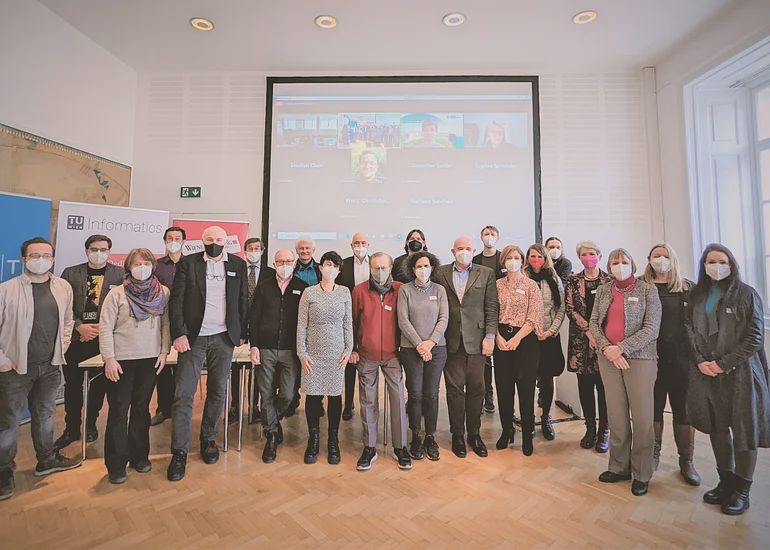“Science is political!”
The war in Ukraine shows how urgent the debate about digital technologies is. The 4th DIGHUM workshop dealt with initiatives for a peaceful digital society.

Digital technologies are still disrupting our society and question the decades-long achievements of democracy. This danger becomes particularly evident in the current dramatic political events. The 4th Digital Humanism (DIGHUM) workshop “Towards a Research and Innovation Roadmap” on 3 & 4 March 2022 assembled internationally renowned researchers, civil servants, and entrepreneurs at TU Wien to discuss the challenges of our digital age.
Vice-Rector for Academic Affairs of TU Wien Kurt Matyas and Dean of TU Wien Informatics Gerti Kappel opened the hybrid workshop “that creates awareness for our responsibility as scientists and decision-makers to act in people’s interests,” as stated by Matyas.
According to DIGHUM Initiator and former Dean of TU Wien Informatics Hannes Werthner, how humans interact with technology is essential – Not the technology itself is problematic, but the way we use it. This pattern tragically applies to the current situation in Ukraine, where among many implications of digital technologies, web and social media amplify activism and donation campaigns on the one hand but immensely strengthen propagandistic content on the other.
Policies and the Power of Science
That is why technology, law, and policy development have to go hand in hand to create effective regulations based on public discourse. The first steps have already been taken, as George Metakides, President of the Digital Enlightenment Forum, points out: The EU is striving for DIGHUM principles in key policies such as the EU Data Act or the Digital Markets and Services Act. In 2021, the EU established the first law on Artificial Intelligence by a major regulator – The EU Artificial Intelligence Act, dealing with high-risk applications such as government-run social scoring.
These changes would not have been possible without underlying research – working together is key in policy development. “Who trains the politicians?“ Gerti Kappel asks, “Decision-makers create insufficient laws if they are not informed well enough to develop them. We as scientists have to give the vital input to develop rules and regulations.”
In two extensive panels on research contributions, experts in their field of Informatics such as Edward A. Lee (University of California, Berkeley, USA), Moshe Vardi (Rice University, TX, USA), Robin Burke (University of Colorado, Boulder, USA), Paola Inverardi (Università dell’Aquila, Italy), Martina Lindorfer (TU Wien Informatics, Austria) and Brigitte Krenn (OFAI, Austria) presented results and ideas to specify and overcome challenges in research on the digital society.
How to bring people together
Transdisciplinarity beyond fields, institutions, and borders is critical for shaping a digital society’s mutual values. “To move forward, we have to open the doors of our compartmentalized knowledge and evaluate our own disciplines. Not only in research but most importantly in education,” Carlo Ghezzi, Emeritus Professor at Politecnico di Milano, emphasizes. Curricula developments in computer sciences and humanities have commenced. Still, the DIGHUM allies are pushing for further steps - such as the plan for an EU-wide Master’s program aligned with core principles of Digital Humanism.
To overcome discipline boundaries remains challenging, “inevitably so because interdisciplinarity has no time to mature in a budget-driven, project-based academic world,” Helga Nowotny, former President of the European Research Council, points out. Therefore, working together long-term needs extensive funding. In Austria, the Science and Technology Fund (WWTF) is currently expanding its support with new DIGHUM funding activities.
Past and current initiatives show that continuous collaboration is possible. An international panel of experts from academia and industry demonstrated how very different organizations – from schools, universities, or municipal governments to companies – can establish successful cooperation frameworks. Best practice examples include among many Welcome.TU.Code at TU Wien Informatics, which started as a refugee program and offers IT courses for educationally alienated youth since 2021. The Digital Society Netherlands, an association and research program of 14 Dutch universities to develop humanistic technologies, or the development of an IEEE CertifAIEd Framework for AI Ethics for the City of Vienna with Wiener Stadtwerke.
The 4th DIGHUM Workshop was organized by Peter Knees, Julia Neidhardt, and Erich Prem of TU Wien Informatics.
Visit DIGHUM’s Youtube Channel to watch the 4th DIGHUM Workshop lectures and many more.
The 4th DIGHUM workshop was hosted by TU Wien Informatics, sponsored by the Vienna Business Agency, the Federal Ministry for European and International Affairs, and the WWTF.

